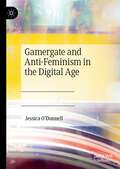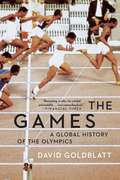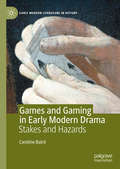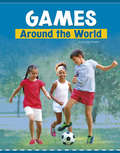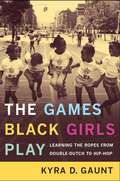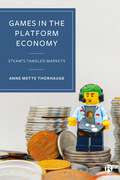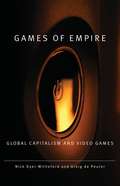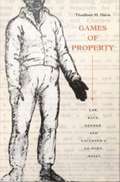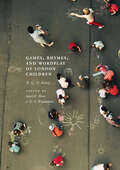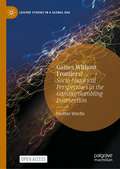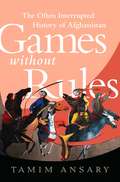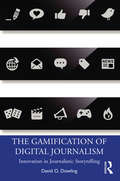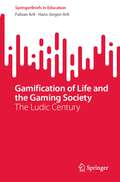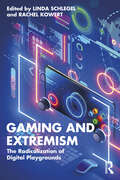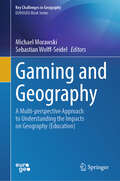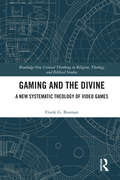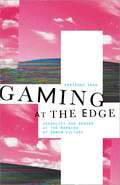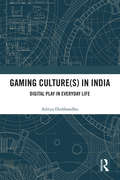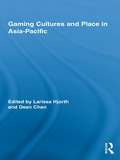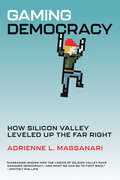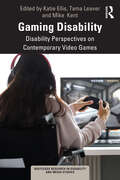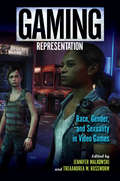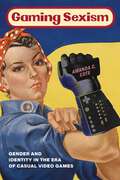- Table View
- List View
Gamergate and Anti-Feminism in the Digital Age
by Jessica O'DonnellThis book provides an in-depth, feminist and sociological analysis of Gamergate, a major social movement and anti-feminist harassment campaign. Gamergate provides a clear example of both how a modern anti-feminist ‘backlash’ is enacted, and how feminists in the digital age respond. Chapters connect Gamergate to the broader Men’s Rights Activism (MRA) political movement, examining men’s anxieties surrounding what they see as an erosion of male privilege, their conflation of privilege with rights, as well as their use of social media to harass and attack women as a response to their perceived oppression. Likewise, the author analyses the online strategies used by feminists to respond to this backlash, how social media is harnessed to build a feminist movement, the effectiveness of these online strategies, and the parallels that these actions have with those from previous waves of feminism. Finally, the author reflects on what has changed with regards to MRA, online harassment, and digital feminism after the height of Gamergate.This book will be of interest to scholars in Gender Studies, Sociology, and Media Studies.
The Games: A Global History of the Olympics
by David GoldblattThe definitive sports and social history of the modern Olympic Games--by one of the most celebrated sportswriters of our time.Renowned sportswriter David Goldblatt has been hailed by the Wall Street Journal for writing "with the expansive eye of a social and cultural critic" In The Games Goldblatt delivers a magisterial history of the biggest sporting event of them all: the Olympics. He tells the epic story of the Games from their reinvention in Athens in 1896 to the present day, chronicling classic moments of sporting achievement from Jesse Owens to Nadia Comăneci, the Miracle on Ice to Usain Bolt. He goes beyond the medal counts to explore how international conflicts have played out at the Olympics, including the role of the Games in Fascist Germany and Italy, the Cold War, and the struggles of the postcolonial world for recognition. He also tells the extraordinary story of how women fought to be included on equal terms, how the Paralympics started in the wake of World War II, and how the Olympics reflect changing attitudes to race and ethnicity.
Games and Gaming in Early Modern Drama: Stakes and Hazards (Early Modern Literature in History)
by Caroline BairdThis book is a close taxonomic study of the pivotal role of games in early modern drama. The presence of the game motif has often been noticed, but this study, the most comprehensive of its kind, shows how games operate in more complex ways than simple metaphor and can be syntheses of emblem and dramatic device. Drawing on seventeenth-century treatises, including Francis Willughby’s Book of Games, which only became available in print in 2003, and divided into chapters on Dice, Cards, Tables (Backgammon), and Chess, the book brings back into focus the symbolism and divinatory origins of games. The work of more than ten dramatists is analysed, from the Shakespeare and Middleton canon to rarer plays such as The Spanish Curate, The Two Angry Women of Abington and The Cittie Gallant. Games and theatre share common ground in terms of performance, deceit, plotting, risk and chance, and the early modern playhouse provided apt conditions for vicarious play. From the romantic chase to the financial gamble, and in legal contest and war, the twenty-first century is still engaging the game. With its extensive appendices, the book will appeal to readers interested in period games and those teaching or studying early modern drama, including theatre producers, and awareness of the vocabulary of period games will allow further references to be understood in non-dramatic texts.
Games Around the World (Customs Around the World)
by Lindsay ShafferWhat do tic-tac-toe, Pilolo, and hookey have in common? They're all games! Find out what people play around the world in this engaging series that develops kids' understanding of our diverse global community and their place in it. What game will you play next?
The Games Black Girls Play: Learning the Ropes from Double-Dutch to Hip-Hop
by Kyra D. Gaunt2007 Alan Merriam Prize presented by the Society for Ethnomusicology 2007 PEN/Beyond Margins Book Award FinalistExplores how the traditions of black music are intertwined in the games black girls grow up withWhen we think of African American popular music, our first thought is probably not of double-dutch: girls bouncing between two twirling ropes, keeping time to the tick-tat under their toes. But this book argues that the games black girls play—handclapping songs, cheers, and double-dutch jump rope—both reflect and inspire the principles of black popular musicmaking.The Games Black Girls Play illustrates how black musical styles are incorporated into the earliest games African American girls learn—how, in effect, these games contain the DNA of black music. Drawing on interviews, recordings of handclapping games and cheers, and her own observation and memories of gameplaying, Kyra D. Gaunt argues that black girls' games are connected to long traditions of African and African American musicmaking, and that they teach vital musical and social lessons that are carried into adulthood. In this celebration of playground poetry and childhood choreography, she uncovers the surprisingly rich contributions of girls’ play to black popular culture.
Games in the Platform Economy: Steam's Tangled Markets
by Anne Mette ThorhaugeThis book examines the evolution of digital platform economies through the lens of online gaming. Offering valuable empirical work on Valve’s ‘Steam’ platform, Thorhauge examines the architecture of this global online videogame marketplace and the way it enables new markets and economic transactions. Drawing on infrastructure, software, platform and game studies, the book interrogates the implications of these transactions, both in terms of their legality, but also in how they create new forms of immaterial labour. Shedding new light on a previously under-explored branch of the study of digital platforms, this book brings a unique economic sociology perspective into the growing literature on videogame studies.
Games of Empire: Global Capitalism and Video Games (Electronic Mediations #29)
by Nick Dyer-Witheford Greig de PeuterIn the first decade of the twenty-first century, video games are an integral part of global media culture, rivaling Hollywood in revenue and influence. No longer confined to a subculture of adolescent males, video games today are played by adults around the world. At the same time, video games have become major sites of corporate exploitation and military recruitment.In Games of Empire, Nick Dyer-Witheford and Greig de Peuter offer a radical political critique of such video games and virtual environments as Second Life, World of Warcraft, and Grand Theft Auto, analyzing them as the exemplary media of Empire, the twenty-first-century hypercapitalist complex theorized by Michael Hardt and Antonio Negri. The authors trace the ascent of virtual gaming, assess its impact on creators and players alike, and delineate the relationships between games and reality, body and avatar, screen and street. Games of Empire forcefully connects video games to real-world concerns about globalization, militarism, and exploitation, from the horrors of African mines and Indian e-waste sites that underlie the entire industry, the role of labor in commercial game development, and the synergy between military simulation software and the battlefields of Iraq and Afghanistan exemplified by Full Spectrum Warrior to the substantial virtual economies surrounding World of Warcraft, the urban neoliberalism made playable in Grand Theft Auto, and the emergence of an alternative game culture through activist games and open-source game development.Rejecting both moral panic and glib enthusiasm, Games of Empire demonstrates how virtual games crystallize the cultural, political, and economic forces of global capital, while also providing a means of resisting them.
The Games of Land Dispossession: Urban Governance and Sports Mega-Events (Marx, Engels, and Marxisms)
by Erick OmenaThis book offers a comparative study of state strategies in relation to urban redevelopment projects associated with sports mega-events in Brazil, South Africa and the United Kingdom. It examines urban governance strategies employed to dispossess working-class communities of their land and counteract the subsequent emergence of discontent in various national contexts, offering an intricate analysis of the mechanisms of class dominance operating across diverse regions of the globe. This is based on the application of Gramscian theory concerning the capitalist state and its fluid interplay between coercion and consent. Juxtaposing historical trajectories in the execution of redevelopment initiatives linked to large-scale sporting events, the book offers an in-depth examination of the state-civil society relations shaping the London 2012 and Rio 2016 Olympic Parks, alongside the regeneration initiatives concerning the Maracanã stadium in Rio de Janeiro and the Ellis Park stadium in Johannesburg – respectively earmarked for the 2014 and 2010 FIFA World Cups. Drawing on insights from a range of disciplines and an explicitly Gramscian analytical framework, this book will appeal to students and scholars in urban planning, sport sociology, development studies, and human geography.
Games of Property: Law, Race, Gender, and Faulkner's Go Down, Moses
by Thadious M. DavisIn Games of Property, distinguished critic Thadious M. Davis provides a dazzling new interpretation of William Faulkner's Go Down, Moses. Davis argues that in its unrelenting attention to issues related to the ownership of land and people, Go Down, Moses ranks among Faulkner's finest and most accomplished works. Bringing together law, social history, game theory, and feminist critiques, she shows that the book is unified by games--fox hunting, gambling with cards and dice, racing--and, like the law, games are rule-dependent forms of social control and commentary. She illuminates the dual focus in Go Down, Moses on property and ownership on the one hand and on masculine sport and social ritual on the other. Games of Property is a masterful contribution to understandings of Faulkner's fiction and the power and scope of property law.
Games, Rhymes, and Wordplay of London Children
by N. G. KelseyThis book presents a unique annotated collection of some 2000 playground games, rhymes, and wordplay of London children. It charts continuity and development in childlore at a time of major social and cultural change and offers a detailed snapshot of changes in the traditions and language of young people. Topics include: starting a game; counting-out rhymes; games (without songs); singing and chanting games; clapping, skipping, and ball bouncing games; school rhymes and parodies; teasing and taunting; traditional belief and practice; traditional wordplay; and a concluding miscellany. Recorded mainly in the 1980s by primary schoolteacher Nigel Kelsey, transcribed verbatim from the children’s own words, and accompanied by extensive commentaries and annotation, the book sets a wealth of new information in the wider historical and contemporary context of existing studies in Britain, Ireland, and other parts of the English-speaking world. This valuable new resource will open new avenues for research and be of particular interest to folklorists and linguists, as well as to those working across the full spectrum of social, cultural, and educational studies.
Games Without Frontiers?: Socio-historical Perspectives at the Gaming/Gambling Intersection (Leisure Studies in a Global Era)
by Heather WardleThis open access book focuses on how and why digital games and gambling are increasingly intertwined and asks “does this matter?” Looking at how “loot boxes” became the poster child for the convergence of gambling and gaming, Wardle traces how we got here. She argues that the intersection between gambling and gaming cultures has a long lineage, one that can be traced back throughout the 20th century but also incorporates more recent trends like the poker boom of the 1990s, the development of social media gambling products and the development of skin betting markets. Underpinned by changing technology, which facilitated new ways to bet, trade and play, the intersection between gaming and gambling cultures and products has accelerated within the last decade – and shows little signs of stopping. Wardle explores what this means for our understanding of risk, how gaming and gambling entities use each other for commercial advantage, and crucially explores what young people think of this, before making recommendations for action.
Games without Rules: The Often-Interrupted History of Afghanistan
by Tamim AnsaryToday, most Westerners still see the war in Afghanistan as a contest between democracy and Islamist fanaticism. That war is real; but it sits atop an older struggle, between Kabul and the countryside, between order and chaos, between a modernist impulse to join the world and the pull of an older Afghanistan: a tribal universe of village republics permeated by Islam.<P><P> Now, Tamim Ansary draws on his Afghan background, Muslim roots, and Western and Afghan sources to explain history from the inside out, and to illuminate the long, internal struggle that the outside world has never fully understood. It is the story of a nation struggling to take form, a nation undermined by its own demons while, every 40 to 60 years, a great power crashes in and disrupts whatever progress has been made. Told in conversational, storytelling style, and focusing on key events and personalities, Games without Rules provides revelatory insight into a country at the center of political debate.
The Gamification of Digital Journalism: Innovation in Journalistic Storytelling
by David O. DowlingThis book examines the brief yet accelerated evolution of newsgames, a genre that has emerged from puzzles, quizzes, and interactives augmenting digital journalism into full-fledged immersive video games from open-world designs to virtual reality experiences. Critics have raised questions about the credibility and ethics of transforming serious news stories of political consequence into entertainment media, and the risks of trivializing grave and catastrophic events into mere games. Dowling explores both the negatives of newsgames, and how the use of entertainment media forms and their narrative methods mainly associated with fiction can add new and potentially more powerful meaning to news than traditional formats allow. The book also explores how industrial and cultural shifts in the digital publishing industry have enabled newsgames to evolve in a manner that strengthens certain core principles of journalism, particularly advocacy on behalf of marginalized and oppressed groups. Cutting-edge and thoughtful, The Gamification of Digital Journalism is a must-read for scholars, researchers, and practitioners interested in multimedia journalism and immersive storytelling.
Gamification of Life and the Gaming Society: The Ludic Century (SpringerBriefs in Education)
by Fabian Arlt Hans-Jürgen ArltThis interesting book discusses why, as an activity, topic and metaphor, play and game have become an integral part of modern life. Empirically exemplary and theoretically grounded, this book discusses the developments and expansions in gaming, from easily accessible casual games to the galaxy-spanning gaming worlds of Massively Multiplayer Online Role-Playing Games (MMORPGs). It shows how gaming has become a focal point of the entertainment industry, marked by boundless professionalization and monetization, especially in the realm of sports, and how games become global platforms for social networks, where players from all over the world meet in digital sandboxes. The combination of the virtual and the ludic creates hyperreal spaces in which people try out new forms of interaction, cooperation, and even brainstorming. The authors ask if this behavior has become the new way of life and the new normal, and if this heralds the ludic century. They take readers on a journey to understand the dynamics of today's gaming society, and base their observations and analyses on an original theory of play, which, in contrast to social normalcy, revolves around the allure and threats of the unexpected. This book is of interest to students and researchers of social science and communication studies, especially those working on the interface of AI and society.
Gaming: Essays On Algorithmic Culture (Electronic Mediations #18)
by Alexander R. GallowayVideo games have been a central feature of the cultural landscape for over twenty years and now rival older media like movies, television, and music in popularity and cultural influence. Yet there have been relatively few attempts to understand the video game as an independent medium. Most such efforts focus on the earliest generation of text-based adventures (Zork, for example) and have little to say about such visually and conceptually sophisticated games as Final Fantasy X, Shenmue, Grand Theft Auto, Halo, and The Sims, in which players inhabit elaborately detailed worlds and manipulate digital avatars with a vast—and in some cases, almost unlimited—array of actions and choices. In Gaming, Alexander Galloway instead considers the video game as a distinct cultural form that demands a new and unique interpretive framework. Drawing on a wide range of disciplines, particularly critical theory and media studies, he analyzes video games as something to be played rather than as texts to be read, and traces in five concise chapters how the &“algorithmic culture&” created by video games intersects with theories of visuality, realism, allegory, and the avant-garde. If photographs are images and films are moving images, then, Galloway asserts, video games are best defined as actions. Using examples from more than fifty video games, Galloway constructs a classification system of action in video games, incorporating standard elements of gameplay as well as software crashes, network lags, and the use of cheats and game hacks. In subsequent chapters, he explores the overlap between the conventions of film and video games, the political and cultural implications of gaming practices, the visual environment of video games, and the status of games as an emerging cultural form. Together, these essays offer a new conception of gaming and, more broadly, of electronic culture as a whole, one that celebrates and does not lament the qualities of the digital age. Alexander R. Galloway is assistant professor of culture and communication at New York University and author of Protocol: How Control Exists after Decentralization.
Gaming and Extremism: The Radicalization of Digital Playgrounds
by Linda Schlegel Rachel KowertCharting the increase in the use of games for the dissemination of extremist propaganda, radicalization, recruitment, and mobilization, this book examines the "gamification of extremism."Editors Linda Schlegel and Rachel Kowert bring together a range of insights from world-leading experts in the field to provide the first comprehensive overview of gaming and extremism. The potential nexus between gaming and extremism has become a key area of concern for researchers, policymakers, and practitioners seeking to prevent and counter radicalization and this book offers insights into key trends and debates, future directions, and potential prevention efforts. This includes the exploration of how games and game adjacent spaces, such as Discord, Twitch, Steam, and DLive, are being leveraged by extremists for the purposes of radicalization, recruitment, and mobilization. Additionally, the book presents the latest counterterrorism techniques, surveys promising preventing/countering violent extremism (P/CVE) measures currently being utilized in the gaming sphere, and examines the ongoing challenges, controversies, and current gaps in knowledge in the field.This text will be of interest to students and scholars of gaming and gaming culture, as well as an essential resource for researchers and practitioners working in prevention and counter-extremism, professionals working at gaming-related tech companies, and policymakers.The Open Access version of this book, available at www.taylorfrancis.com, has been made available under a Creative Commons Attribution-Non Commercial-No Derivatives 4.0 license.
Gaming and Geography: A Multi-perspective Approach to Understanding the Impacts on Geography (Education) (Key Challenges in Geography)
by Michael Morawski Sebastian Wolff-SeidelThis book explores the uncharted territory where gaming and geography intersect in "Gaming and Geography (Education)." This book bridges the gap between video games and geography, delving into the constructivist creative processes of game development, gameplay, and critical reflections on video games' role in geographical discourses. Through a multi-perspective lens, the book examines how video games can facilitate the exploration of geographic questions and act as catalysts for critical discourses. Scholars shed light on the geographies presented in video games, including their representations, spatial images, and policies. By viewing video games as cultural and critical geography practices, the authors enrich the political, socio-cultural, and critical geographies associated with this medium. A key argument of the book is that video games can foster systemic competence and networked thinking, particularly in addressing complex socio-ecological challenges like climate change and migration. In contrast to traditional geography classes, digital games provide valuable simulations of complex systems, enhancing students' understanding and skills. The book also explores other possibilities such as digital field trips and language support to enhance the educational experience. "Gaming and Geography (Education)" offers a compelling narrative that highlights the diverse roles video games can play in geographic education. By exploring the intersection of gaming and geography, this book deepens our understanding of this dynamic relationship and its impact on critical geographies within the realm of video games.
Gaming and the Divine: A New Systematic Theology of Video Games (Routledge New Critical Thinking in Religion, Theology and Biblical Studies)
by Frank G. BosmanThis book formulates a new theological approach to the study of religion in gaming. Video games have become one of the most important cultural artifacts of modern society, both as mediators of cultural, social, and religious values and in terms of commercial success. This has led to a significant increase in the critical analysis of this relatively new medium, but theology as an academic discipline is noticeably behind the other humanities on this subject. The book first covers the fundamentals of cultural theology and video games. It then moves on to set out a Christian systematic theology of gaming, focusing on creational theology, Christology, anthropology, evil, moral theology, and thanatology. Each chapter introduces case studies from video games connected to the specific theme. In contrast to many studies which focus on online multiplayer games, the examples considered are largely single player games with distinct narratives and ‘end of game’ moments. The book concludes by synthesizing these themes into a new theology of video games. This study addresses a significant aspect of contemporary society that has yet to be discussed in any depth by theologians. It is, therefore, a fantastic resource for any scholar engaging with the religious aspects of digital and popular culture.
Gaming at the Edge: Sexuality and Gender at the Margins of Gamer Culture
by Adrienne ShawVideo games have long been seen as the exclusive territory of young, heterosexual white males. In a media landscape dominated by such gamers, players who do not fit this mold, including women, people of color, and LGBT people, are often brutalized in forums and in public channels in online play. Discussion of representation of such groups in games has frequently been limited and cursory. In contrast, Gaming at the Edge builds on feminist, queer, and postcolonial theories of identity and draws on qualitative audience research methods to make sense of how representation comes to matter. In Gaming at the Edge, Adrienne Shaw argues that video game players experience race, gender, and sexuality concurrently. She asks: How do players identify with characters? How do they separate identification and interactivity? What is the role of fantasy in representation? What is the importance of understanding market logic? In addressing these questions Shaw reveals how representation comes to matter to participants and offers a perceptive consideration of the high stakes in politics of representation debates. Putting forth a framework for talking about representation, difference, and diversity in an era in which user-generated content, individualized media consumption, and the blurring of producer/consumer roles has lessened the utility of traditional models of media representation analysis, Shaw finds new insight on the edge of media consumption with the invisible, marginalized gamers who are surprising in both their numbers and their influence in mainstream gamer culture.
Gaming Culture(s) in India: Digital Play in Everyday Life
by Aditya DeshbandhuThis volume critically analyzes the multiple lives of the "gamer" in India. It explores the "everyday" of the gaming life from the player’s perspective, not just to understand how the games are consumed but also to analyze how the gamer influences the products’ many (virtual) lives. Using an intensive ethnographic approach and in-depth interviews, this volume situates the practice of gaming under a broader umbrella of digital leisure activities and foregrounds the proliferation of gaming as a new media form and cultural artifact; critically questions the term gamer and the many debates surrounding the gamer tag to expand on how the gaming identity is constructed and expressed; details participants’ gaming habits, practices and contexts from a cultural perspective and analyzes the participants’ responses to emerging industry trends, reflections on playing practices and their relationships to friends, communities and networks in gaming spaces; and examines the offline and online spaces of gaming as sites of contestation between developers of games and the players. A holistic study covering one of the largest video game bases in the world, this volume will be of great interest to scholars and researchers of cultural studies, media and communication studies and science and technology studies, as well as be of great appeal to the general reader.
Gaming Cultures and Place in Asia-Pacific (Routledge Studies in New Media and Cyberculture)
by Larissa Hjorth Dean ChanThis collection explores the relationship between digital gaming and its cultural context by focusing on the burgeoning Asia-Pacific region. Encompassing key locations for global gaming production and consumption such as Japan, China, and South Korea, as well as increasingly significant sites including Australia and Singapore, the region provides a wealth of divergent examples of the role of gaming as a socio-cultural phenomenon. Drawing from micro ethnographic studies of specific games and gaming locales to macro political economy analyses of techno-nationalisms and trans-cultural flows, this collection provides an interdisciplinary model for thinking through the politics of gaming production, representation, and consumption in the region.
Gaming Democracy: How Silicon Valley Leveled Up the Far Right
by Adrienne L. MassanariHow play and gaming culture have mainstreamed far right ideology through social media platforms.From #Gamergate to the ongoing Big Lie, the far right has gone mainstream. In Gaming Democracy, Adrienne Massanari tracks the flames of toxicity found in the far right and &“alt-right&” movements as they increasingly take up oxygen in American and global society. In this pathbreaking contribution to the fields of internet studies, game studies, and gender studies, Massanari argues that Silicon Valley&’s emphasis on meritocracy and free speech absolutism has driven this rightward slide. These ideologies have been coded into social media spaces that implicitly silence marginalized communities and subject them to rampant abuse by groups that have learned to &“game&” the ecology of platforms, algorithms, and attention economies.While populist movements are not new, phenomena such as QAnon, parental rights activism, and COVID denialism are uniquely &“of the internet,&” with supporters demonstrating both technical acumen and an ability to use memes and play as a way of both building community and fomenting dissent. Massanari explores the ways that the far right uses memetic humor and geek masculinity as tools both to create a sense of community within these leaderless groups and to obfuscate their intentions. Using the lens of play and game studies as well as the concept of &“metagaming,&” Gaming Democracy is a novel contribution to our understanding of online platforms and far right political activism.
Gaming Disability: Disability Perspectives on Contemporary Video Games (Routledge Research in Disability and Media Studies)
by Katie Ellis Tama Leaver Mike KentThis book explores the opportunities and challenges people with disabilities experience in the context of digital games from the perspective of three related areas: representation, access and inclusion, and community. Drawing on key concerns in disability media studies, the book brings together scholars from disability studies and game studies, alongside game developers, educators, and disability rights activists, to reflect upon the increasing visibility of disabled characters in digital games. Chapters explore the contemporary gaming environment as it relates to disability on platforms such as Twitch, Minecraft, and Tingyou, while also addressing future possibilities and pitfalls for people with disabilities within gaming given the rise of virtual reality applications, and augmented games such as Pokémon Go. The book asks how game developers can attempt to represent diverse abilities, taking games such as BlindSide and Overwatch as examples. A significant collection for scholars and students interested in the critical analysis of digital games, this volume will be of interest across several disciplines including game studies, game design and development, internet, visual, cultural, communication and media studies, as well as disability studies.
Gaming Representation: Race, Gender, and Sexuality in Video Games
by Jennifer Malkowski Treaandrea M. RusswormRecent years have seen an increase in public attention to identity and representation in video games, including journalists and bloggers holding the digital game industry accountable for the discrimination routinely endured by female gamers, queer gamers, and gamers of color. Video game developers are responding to these critiques, but scholarly discussion of representation in games has lagged far behind. Gaming Representation examines portrayals of race, gender, and sexuality in a range of games, from casuals like Diner Dash, to indies like Journey and The Binding of Isaac, to mainstream games from the Grand Theft Auto, BioShock, Spec Ops, The Last of Us, and Max Payne franchises. Arguing that representation and identity function as systems in games that share a stronger connection to code and platforms than it may first appear, the contributors to this volume push gaming scholarship to new levels of inquiry, theorizing, and imagination.
Gaming Sexism: Gender and Identity in the Era of Casual Video Games
by Amanda C. CoteInterviews with female gamers about structural sexism across the gaming landscapeWhen the Nintendo Wii was released in 2006, it ushered forward a new era of casual gaming in which video games appealed to not just the stereotypical hardcore male gamer, but also to a much broader, more diverse audience. However, the GamerGate controversy six years later, and other similar public incidents since, laid bare the internalized misogyny and gender stereotypes in the gaming community. Today, even as women make up nearly half of all gamers, sexist assumptions about the what and how of women’s gaming are more actively enforced.In Gaming Sexism, Amanda C. Cote explores the video game industry and its players to explain this contradiction, how it affects female gamers, and what it means in terms of power and gender equality. Across in-depth interviews with women-identified gamers, Cote delves into the conflict between diversification and resistance to understand their impact on gaming, both casual and “core” alike. From video game magazines to male reactions to female opponents, she explores the shifting expectations about who gamers are, perceived changes in gaming spaces, and the experiences of female gamers amidst this gendered turmoil. While Cote reveals extensive, persistent problems in gaming spaces, she also emphasizes the power of this motivated, marginalized audience, and draws on their experiences to explore how structural inequalities in gaming spaces can be overcome. Gaming Sexism is a well-timed investigation of equality, power, and control over the future of technology.
